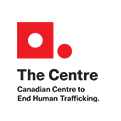Trafficking in Persons Report 2019
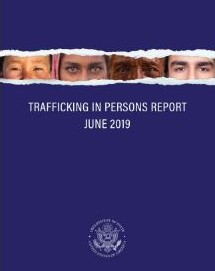
“This year, the TIP Report serves as a call to action for governments around the world to embrace the full meaning of the Palermo Protocol and implement their domestic laws in a manner that protects all victims and punishes all traffickers. ” – Secretary of State Michael R. Pompeo
Trafficking in Persons Report 2018
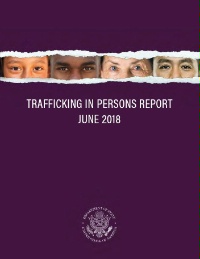
“This year’s report focuses on effective ways local communities can address human trafficking proactively and on how national governments can support and empower them. Local communities are the most affected by this abhorrent crime and are also the first line of defense against human trafficking. By engaging and training law enforcement, religious leaders, teachers, tribal elders, business executives, and communities, we become more vigilant and learn to identify and address vulnerabilities swiftly. Proactive community-driven measures strengthen our ability to protect our most vulnerable and weaken a criminal’s ability to infiltrate, recruit, and exploit. I have experienced firsthand that individuals closest to a problem are often the best resource to solving it, which is why the Department prioritizes equipping and empowering front-line civil society leaders.
“Modern slavery has no place in the world, and I intend to ensure, through diplomatic engagement and increased action, that the United States government’s leadership in combating this global threat is sustained in the years to come.” – Secretary of State Michael R. Pompeo
Survivor Insights: The Role of Technology in Domestic Minor Sex Trafficking
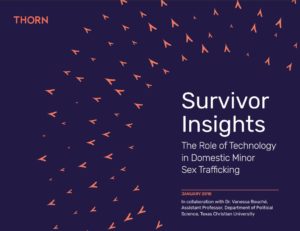 In an effort to strategically inform technology initiatives for combating domestic minor sex trafficking (DMST), Thorn partnered with Dr. Vanessa Bouché at Texas Christian University to survey survivors about their experiences. The survey focused on understanding what role technology played in a victim’s recruitment into, time while in, and exit from DMST. Two hundred and sixty survivors of DMST, through 24 survivor organizations, spanning 14 states, completed the survey.
In an effort to strategically inform technology initiatives for combating domestic minor sex trafficking (DMST), Thorn partnered with Dr. Vanessa Bouché at Texas Christian University to survey survivors about their experiences. The survey focused on understanding what role technology played in a victim’s recruitment into, time while in, and exit from DMST. Two hundred and sixty survivors of DMST, through 24 survivor organizations, spanning 14 states, completed the survey.
Polaris’ Massage Parlor Trafficking Report
Polaris report on Human Trafficking in Illicit Massage Businesses in the United States January 2017.
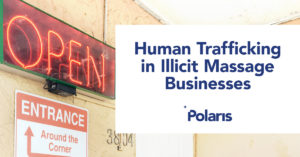
“By mapping and cross referencing numerous publicly available datasets, Polaris found more than 9,000 illicit massage businesses operating in America. They exist in every single state and revenues for these businesses total approximately $2.5 billion a year. Evidence gathered from the Hotline, from focus groups and from extensive case studies suggest that thousands of women are being trafficked in massage parlors in the United States on any given day.”
2017 Trafficking in Persons Report
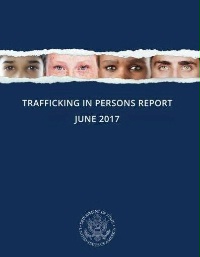 “The Trafficking in Persons (TIP) Report is the U.S. Government’s principal diplomatic tool to engage foreign governments on human trafficking. It is also the world’s most comprehensive resource of governmental anti-trafficking efforts and reflects the U.S. Government’s commitment to global leadership on this key human rights and law enforcement issue. It represents an updated, global look at the nature and scope of trafficking in persons and the broad range of government actions to confront and eliminate it. The U.S. Government uses the TIP Report to engage foreign governments in dialogues to advance anti-trafficking reforms and to combat trafficking and to target resources on prevention, protection and prosecution programs. Worldwide, the report is used by international organizations, foreign governments, and nongovernmental organizations alike as a tool to examine where resources are most needed. Freeing victims, preventing trafficking, and bringing traffickers to justice are the ultimate goals of the report and of the U.S Government’s anti-trafficking policy.”
“The Trafficking in Persons (TIP) Report is the U.S. Government’s principal diplomatic tool to engage foreign governments on human trafficking. It is also the world’s most comprehensive resource of governmental anti-trafficking efforts and reflects the U.S. Government’s commitment to global leadership on this key human rights and law enforcement issue. It represents an updated, global look at the nature and scope of trafficking in persons and the broad range of government actions to confront and eliminate it. The U.S. Government uses the TIP Report to engage foreign governments in dialogues to advance anti-trafficking reforms and to combat trafficking and to target resources on prevention, protection and prosecution programs. Worldwide, the report is used by international organizations, foreign governments, and nongovernmental organizations alike as a tool to examine where resources are most needed. Freeing victims, preventing trafficking, and bringing traffickers to justice are the ultimate goals of the report and of the U.S Government’s anti-trafficking policy.”
Polaris Project Typology Report
Polaris report on defining sex and labour trafficking in the United States March 2017
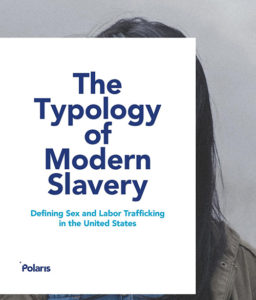 “From sex trafficking within escort services to labor trafficking of farm workers, the ways humans are exploited differ greatly. Each type has unique strategies for recruiting and controlling victims, and concealing the crime. For years, we have been staring at an incomplete chess game, moving pieces without seeing hidden squares or fully understanding the power relationships between players. With The Typology of Modern Slavery, our blurry understanding of the scope of the crime is now coming into sharper focus. Polaris analyzed more than 32,000 cases of human trafficking documented between December 2007 and December 2016 through its operation of the National Human Trafficking Hotline and BeFree Textline—the largest data set on human trafficking in the United States ever compiled and publicly analyzed. Polaris’s research team analyzed the data and developed a classification system that identifies 25 types of human trafficking in the United States. Each has its own business model, trafficker profiles, recruitment strategies, victim profiles, and methods of control that facilitate human trafficking.”
“From sex trafficking within escort services to labor trafficking of farm workers, the ways humans are exploited differ greatly. Each type has unique strategies for recruiting and controlling victims, and concealing the crime. For years, we have been staring at an incomplete chess game, moving pieces without seeing hidden squares or fully understanding the power relationships between players. With The Typology of Modern Slavery, our blurry understanding of the scope of the crime is now coming into sharper focus. Polaris analyzed more than 32,000 cases of human trafficking documented between December 2007 and December 2016 through its operation of the National Human Trafficking Hotline and BeFree Textline—the largest data set on human trafficking in the United States ever compiled and publicly analyzed. Polaris’s research team analyzed the data and developed a classification system that identifies 25 types of human trafficking in the United States. Each has its own business model, trafficker profiles, recruitment strategies, victim profiles, and methods of control that facilitate human trafficking.”
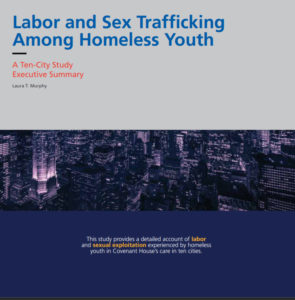 “Human trafficking — the exploitation of a person’s labor through force, fraud, or coercion — is a crime whose victims tend to be society’s most vulnerable. People who are homeless, lack a support system, or are desperate for work are susceptible to the promises of people who would exploit them for labor and for sex. Recently, homeless youth providers in the United States and Canada have become aware that their clients are particularly at risk of trafficking, and research has begun to uncover the extent and contours of the problem within that community.”
“Human trafficking — the exploitation of a person’s labor through force, fraud, or coercion — is a crime whose victims tend to be society’s most vulnerable. People who are homeless, lack a support system, or are desperate for work are susceptible to the promises of people who would exploit them for labor and for sex. Recently, homeless youth providers in the United States and Canada have become aware that their clients are particularly at risk of trafficking, and research has begun to uncover the extent and contours of the problem within that community.”